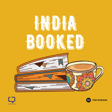
India Booked | Isolation in the aftermath of COVID-19
In this episode of India Booked, Ayushi Mona discusses with social activist, writer and editor Ishmeet Nagpal, an array of essential topics ranging from the upsurge in domestic violence during the lockdown to the plight of migrant workers stranded far away from their homes, the unfair burden of expectations on women during the quarantine and the uncertainty of living in cities.
The podcast explores ‘Isolocation Poems’, which is an anthology of shortlisted poems coedited by Ishmeet that reflects the shared reality of people coping with the shifted reality of life due to the Covid-19 Pandemic.
Listen now to discover how the anthology came to be, the beauty in the collaboration of different poets from different locations, brought together by verses of joy, pain, desire, acceptance, and catharsis, to voice out themes of mental health, feminism, love, family and the current socio-political climate
